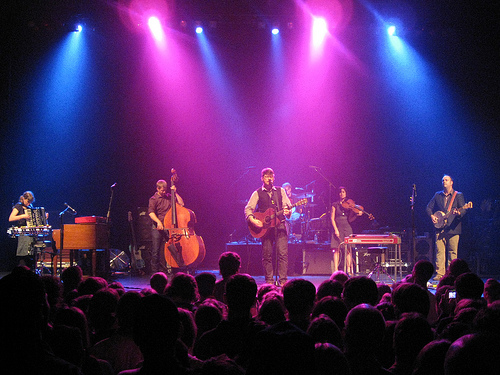Perhaps the epitome of contemporary indie-pop, The Decemberists have made their rounds on the music scene in the past decade, slowly evolving their sound and reinventing how music is made. Formed in Portland, Oregon with a sound that sounds like 1960s British folk rock, The Decemberists have made an impressive impact on modern music. (-Photo/Moeafati)

Colin Meloy, of The Decemberists, performs at the SXSW Festival in March 2009.
Front-man and vocalist Colin Meloy (who sounds like a mixture of R.E.M.’s Michael Stipe and The Beatles’ Paul McCartney) is truly unique, and his voice my take a few listen-throughs to get used to it. He pays homage to classic rock bands with his intricate compositions and lyrics, all while making singing sound like story-telling.
I connected with The Decemberists for that very reason: their songs and albums are stories, not just songs. Meloy’s lyrics are profound and flowery – sometimes it takes a second listen to understand what he’s talking about. But once it clicks, it’s a just such a beautiful moment.
The sweeping keys and background vocals of Jenny Conlee surround you with warmth, while Meloy and alternate guitarist Chris Funk keep the music progressing forward. The Decemberists’ music tends to be epic and all-encompassing, which, in my eyes, always wins over the passive and unoriginal. Still, they have to ability to strip themselves down to nothing but an acoustic guitar and vocals, and manage to sound like the same band.
The band’s debut full-length LP, “Picaresque,” was full songs about sea-travelers, whales, barrow boys and tragedy. When it came out in 2005, critics were unanimous in praise; The Decemberists’ layered attempt at telling stories through music was equal parts devastation and hope that left the listener confused as to whether to cry in sadness or sheer joy. But, once the drums kick in and the time signature speeds up, you can’t help but smile in acceptance.
One song on the album, in particular, made me really take notice of the Portland quintet a few years ago – “The Mariner’s Revenge Song.” The stand-out track runs nearly nine minutes long, begins with a accordion keeping time and tells of a boatman’s quest for revenge in his mother’s name against his deserter father.
After sneaking onto the man’s boat, the song’s protagonist is cleaning his muskets when a giant whale destroys the ship and swallows the crew whole, to which Meloy sings: “Don’t know how I survived/ The crew all was chewed alive/I must’ve slipped between his teeth/But oh, what providence/What divine intelligence/That I should survive as well as he.” Revenge at its finest: in the belly of a whale.
The band’s next album, “The Crane Wife,” was a concept piece that contains the amazing pop anthem “O Valencia!” Their first release off Capitol Records, “The Crane Wife” showed more maturity than their debut and proved that they were around to stay. Their most recent album, “The Hazards of Love,” was released a few weeks ago, and I have not been able to take a listen just yet. However, reviews hail it as the band’s best work, a triumph in eclectic art-indie pop that is going to set them apart from other one-note bands.
This will be The Decemberists’ second trip to Bonnaroo, and my first time seeing them, and I could not be more excited. I hope to hear some of their older music as well as some of this new, heralded material. (-Photo/pneyu)

The Decemberists perform in San Francisco in November 2008.